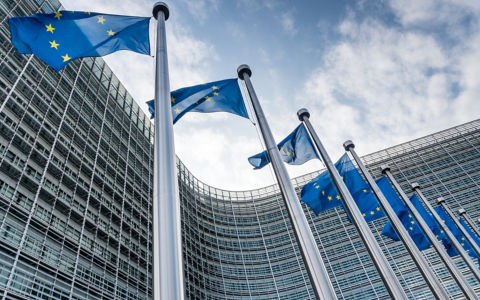- Macro Strategist
Skip to main content
- Funds
- Capabilities
- Insights
- About Us
Asset classes
The views expressed are those of the author at the time of writing. Other teams may hold different views and make different investment decisions. The value of your investment may become worth more or less than at the time of original investment. While any third-party data used is considered reliable, its accuracy is not guaranteed.
A sharp fall in gas prices, China’s reopening and slowing inflation meant European equities not only rose in absolute terms but also significantly outperformed US equities over the last six months. The path forward, however, remains uncertain, suggesting investors need to tread carefully and be selective.
European equities are structurally very cyclical and global markets face a range of cyclical headwinds:
However, I expect European equities to outperform the US over the next three to six months. European equities experienced a period of record outflows throughout 2021, suggesting investors are very cautiously positioned. Moreover, there are several factors that could mitigate and delay the slowdown in growth. These include the persistence of an elevated volume of order backlogs, households continuing to sit on excess savings, the labour market remaining tight and a boost to growth from China’s reopening. Lastly, depressed valuations suggest European equities are already pricing for a fall in earnings.
I remain cautious on consumer and industrial cyclicals, outside of energy-transition plays, because I think they are pricing for an economic recovery that seems too optimistic. In contrast, European small caps offer a more attractive risk/reward outlook. They don’t appear to be priced for a sharp economic recovery and could benefit from the recent strength in the euro. In my view, the European banking sector is also attractively valued and should be able to deliver better earnings momentum than the market, despite the slowdown. Lastly, I think defensive areas within the European growth segment of the market (software, for example) offer potentially attractive upside after they underperformed on the back of higher interest rates.
Over the longer term (18+ months), the outlook for European equities appears structurally much better for three key reasons:
These three reasons suggest that European equity markets are unlikely to experience a repeat of the structural underperformance of the last decade.
Expert

The long-term rewards of a contrarian approach to European equities
Continue readingHow a changing Europe is reshaping credit markets
Continue readingStill opportunities in European equities? Positioning is key
Continue readingEurope: a good hunting ground for high yield?
Continue readingFiscal versus tariffs: what wins out for Europe?
Continue readingURL References
Related Insights

The long-term rewards of a contrarian approach to European equities
Portfolio Manager Tom Horsey and Investment Director Thomas Kramer explain why viewing European equities through a contrarian lens could help investors to uncover long-term opportunities in a rapidly evolving Europe.

How a changing Europe is reshaping credit markets
Portfolio Managers Derek Hynes and Konstantin Leidman explore how a changing Europe is reshaping the region's credit markets and identify key takeaways for investors.

Still opportunities in European equities? Positioning is key
Macro Strategist Nicolas Wylenzek revisits the case for European equities and discusses why positioning can help optimise exposure to Europe’s accelerating regime change.

Europe: a good hunting ground for high yield?
With attractive yields and a low duration profile, high yield can present potentially compelling opportunities for investors, despite the continued volatility.

Fiscal versus tariffs: what wins out for Europe?
Just as investors were starting to explore the potential for growth in Europe, Trump’s tariffs landed. To what extent is the case for Europe still intact?

Sacrificing stocks on the altar of trade
Brij Khurana discusses the Trump administration's new stance on trade and its impact on the US economy, global markets and asset prices.

Chart in Focus: how sustainable is Europe’s rally?
Is the recent rally in European equities sustainable? In this edition of our Chart in Focus series, we explore the potential path ahead.
URL References
Related Insights
DISCLOSURE
This material and its contents may not be reproduced or distributed, in whole or in part, without the express written consent of Wellington Management. This document is intended for information purposes only. It is not an offer or a solicitation by anyone, to subscribe for shares in Wellington Management Funds (Luxembourg) III SICAV (the Fund). Nothing in this document should be interpreted as advice, nor is it a recommendation to buy or sell shares. Investment in the Fund may not be suitable for all investors. Any views expressed are those of the author at the time of writing and are subject to change without notice. Investors should carefully read the Key Facts Statement (KFS), Prospectus, and Hong Kong Covering Document for the Fund and the sub-fund(s) for details, including risk factors, before making an investment decision. Other relevant documents are the annual report (and semi-annual report).
© 2025 Morningstar, Inc. All Rights Reserved. The information contained herein: (1) is proprietary to Morningstar; (2) may not be copied or distributed; and (3) is not warranted to be accurate, complete or timely. Neither Morningstar nor its content providers are responsible for any damages or losses arising from any use of this information. The Overall Morningstar Rating for a fund is derived from a weighted average of the three, five, and ten year (if applicable) ratings, based on risk-adjusted return. Past performance is no guarantee of future results.
Issued by Wellington Management Hong Kong Limited. Investment involves risk. Past performance is not indicative of future performance. This document has not been reviewed by the Securities and Futures Commission of Hong Kong.